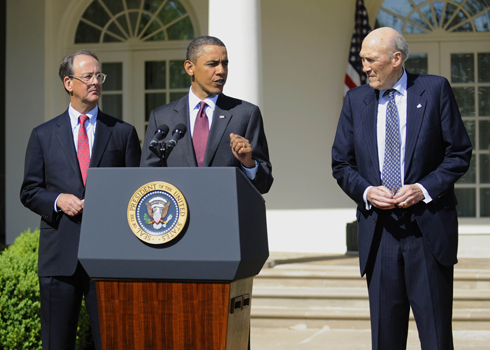Democratic and Republican members of the joint deficit Super Committee will meet Tuesday for their first substantive meeting, which will examine the history and driver of the country’s debt, and the risk it poses in the future.
It will be the committee’s second meeting overall and its first since President Obama pushed the panel in his joint address to Congress to find significantly more than the $1.2 trillion in deficit reduction they’re required to find, to finance a near-term jobs bill.
That pressure has some Republicans saying that Obama’s needlessly complicated the committee’s task — finding $1.2 trillion in cuts, revenues and savings is hard enough! — and members should keep their eyes on the more modest goal spelled out in the debt limit law.
“By asking the Joint Select Committee to increase the $1.5 trillion target to cover the full cost of his plan, the president is essentially tasking a committee designed to reduce the deficit to pay for yet another round of stimulus,” the committee’s co-chair, Rep. Jeb Hensarling (R-TX) said in a statement last week. “This proposal would make the already-arduous challenge of finding bipartisan agreement on deficit reduction nearly impossible.”
In an ironic twist, this has Washington’s career fiscal hawks, who have found common cause with the GOP for the past year, calling nonsense.
“I can tell you the more comprehensive we made it, the easier our job got, the easier it was to get to majority…rather than trying to do little teeny pieces of it,” said Erskine Bowles, co-chair of the White House’s commission on fiscal responsibility, at an event hosted by the Committee for a Responsible Federal Budget (CRFB).
“The tougher we made our proposal, the more people came aboard, I think the same thing can happen with this Super Commission [sic],” said Bowles’ co-chair Alan Simpson.
The Simpson-Bowles plan was never officially reported to Congress, but did garner support of 11 of the commission’s 18 members. This counter-evidence illustrates a political bind Republicans have created for themselves. They don’t want to raise taxes and they don’t want to create space in the budget for Obama’s jobs plan, so they have to artificially constrain the Super Committee’s goals to avoid both. This isn’t necessary, and, according to Bowles and Simpson, it’s actually counterproductive.
Bowles and Simpson, along with CRFB president Maya Macguineas, noted that a credible multi-year deficit reduction plan can buy running room for near-term investments and be phased in in such a way that it doesn’t harm the weak economic recovery.
But baby steps first. The Super Committee’s initial challenge will be simply to reach agreement on the causes and drivers of the debt. If they can’t do that, then they’ll have a hard time agreeing on even the statutory minimum, $1.2 trillion in deficit reduction, let alone muster the will to give their blessing to Obama’s nearly $450 billion jobs plan. Here’s how Bowles described the issue.
“We have an imaginary deficit in this country where the source of that deficit, that imaginary deficit, is waste, fraud, and abuse, foreign aid, oil subsidies, and Nancy Pelosi’s airplane…. The real deficit and the real causes of our deficit are a couple things. First of all we spend twice as much as any other developed country on health care, and that’s true whether you look at it as a percentage of GDP or a per capita basis…the second is that we spend more than the next 14 largest countries combined on our national defense, and that simply is not sustainable, and it also causes like a hollowing out of the country because there’s not the resources available to invest in things like education and infrastructure and high-value added research. And the third is that we give away half of the tax income in deductions and credits.”
Revenues are too low, defense spending is too high, and health care costs are enormous and growing quickly. Republicans contend that the entire problem is too much spending. This is only true if you think it’s wise to end or slash federal programs with broad bipartisan support. If they can’t turn the page on that claim, the panel has its work cut out for it. We’ll get some early indications today.
Get the day’s best political analysis, news and reporting from the TPM team delivered to your inbox every day with DayBreaker. Sign up here, it takes just a few seconds.






